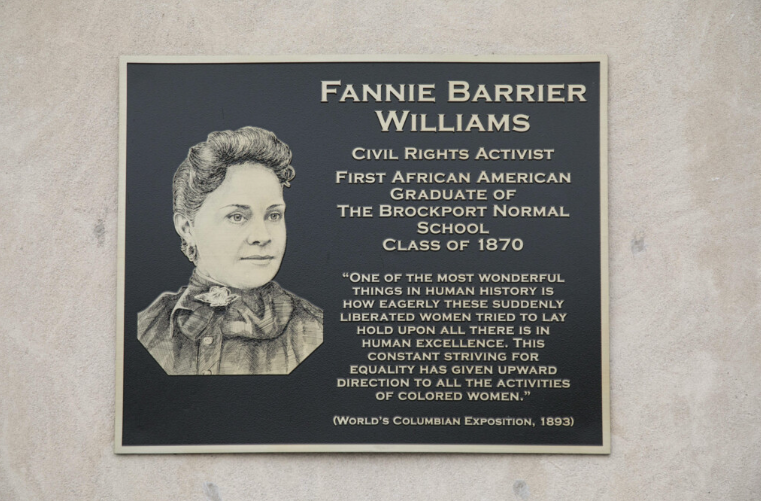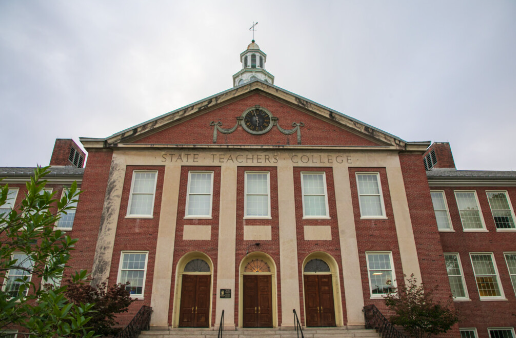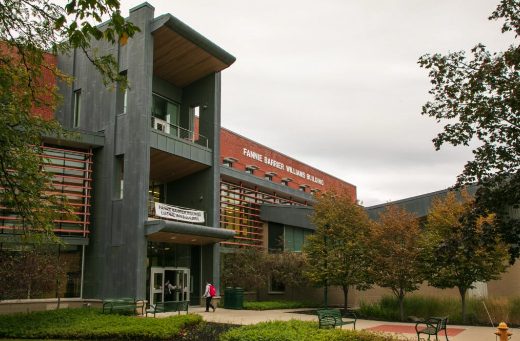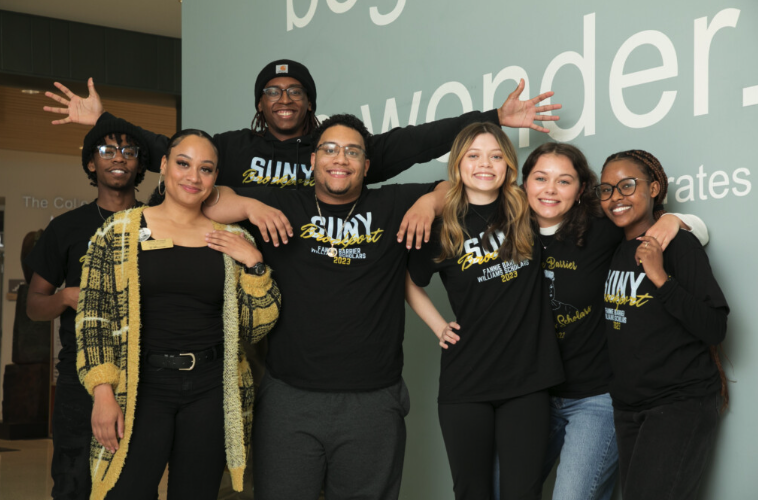If you’re from Brockport, you probably know about Fannie Barrier Williams. But most of us don’t recognize the name, despite her former status as a national celebrity. Barrier Williams was a suffragist, civil rights leader, orator, and changemaker. She was born and raised in Brockport, and hers was one of the only Black families in the community. In 1870, she would become the first Black woman to graduate from SUNY Brockport.
After college, Barrier Williams took a teaching position in Mississippi and experienced a level of racism she had never before encountered. It broke her spirit and led her toward a life as an activist. She moved to Boston to study piano but was asked to leave after her presence made white students uncomfortable. She met her husband, Samuel, and moved to Chicago where he started a law practice, and she became active in the local community.
Barrier Williams started by fighting for women’s rights in the workplace and pushed for housing and health facilities for women and children in poverty. She fought to become the first Black member of the prestigious Chicago Women’s Club and was one of the only female Black presenters at the Chicago World’s Fair in 1893. She gave speeches on her vision for Black women’s intellectual promise and criticized churches that refused to accept Black members. Frederick Douglass witnessed and praised the speeches which led to her national tour as a paid lecturer. She would go on to share podiums with Elizabeth Cady Stanton and Susan B. Anthony, lecturing frequently that all women should have the right to vote.

She helped found the National League of Colored Women and National Association of Colored Women. She and Samuel helped to establish Provident Hospital in Chicago, a facility that would hire and provide nursing training to Black women. In 1909, she helped W.E.B. Du Bois found the NAACP. She was the first Black American to serve on the board of the Chicago Public Library.
Barrier Williams also had a long writing career, providing commentary on local activism and national issues that faced Black women. In 1905, Barrier Williams played a key role in the development of the Frederick Douglass Center in Chicago and the Phyllis Wheatley Center, to support Black women looking for work.
In 1926, five years after losing her husband, Barrier Williams moved back home to Brockport to care for her sister Ella. They lived together for eighteen years at 163 Erie Street until Fannie died at the age of eighty-nine. Today, Barrier Williams’s tenacity and drive lives on in an incredible group of college students in her hometown.
The Fannie Barrier Williams Scholars program was launched at SUNY Brockport with a $1.1 million gift from ESL Federal Credit Union and provides four-year scholarships to students from low-income families with an unmet financial need. Approximately thirty students per year receive the award, which can cover traditional out-of-pocket expenses such as tuition, room and board, and even books.
This program is intended to support a student’s ability to persist to graduation by providing academic, personal, and career support. There is an intentional focus on students who demonstrate resilience and have overcome adversity. Of the twenty-nine inaugural scholars, twenty are students of color and nineteen are first generation college students.
Jianna Howard leads this group as the academic success coordinator for the Fannie Barrier Williams Scholars. She teaches the academic planning seminar, which provides learning strategies, study skills, and an introduction to the college experience. Howard serves as advisor until they declare a major.
I met with Howard and six of the scholars in the Fannie Barrier Williams Liberal Arts Building, which features an art gallery and beautiful spaces for meeting and studying. The students are all sophomores now and getting ready for their midterm exams.


“We use the word family here a lot. We are a family, and we all started out together,” says Masengesho Irasubiza. Originally from Rwanda, Irasubiza says that she always knew she would go to college but couldn’t imagine being able to afford living there. She is now majoring in biology and serving in the student senate.
The scholars program has made all the difference in her college education and experience. “I have no choice but to grow by living here on campus. I tell myself this is a great opportunity that you have been given. Don’t let it go to waste.” The scholars all take part in the Bridge Program, which helps them bridge the gap between high school and college. They move in a week early to tour the grounds, get set up with meal plans and IDs, and get an early start on engaging with the clubs and activities on campus. “I try to give them everything I didn’t have as a freshman.” Howard says.
Zoe Church is from Avon and is majoring in early childhood inclusive education. “I really enjoyed the Bridge Program. Going to college is scary. It made me a lot less anxious. Jianna is a huge help, too, if I have any questions or need any advice.”
“In all that you do, or may aim to do, the colored woman must be counted in, not only as a factor, but as a necessity.”
—Fannie Barrier Williams, 1902
The students are required to check in with Howard twice a semester, but she sees most of them much more frequently. They come to her when they are struggling or to show her a high score on a test. She plans activities for the group, including haunted hayrides, pumpkin carving, and even a Friendsgiving celebration. The scholars agree that Howard is like a friend and a mom.
Originally from Sudan, Mohamed Musa is a computer science major and the treasurer of the Muslim Student Association on campus. “Before this program, I was anxious—it was a big transition. But there are people here to help you, no matter what. I’m not alone. That makes me feel safe and more confident.”

The high cost of college can create even more anxiety, including all the books students need to purchase. KJ Newman is a graphic design major and doesn’t hesitate when I ask him what the best part of the scholars program is. “It’s the money! The books—I get to pick them all out for free.” Along with Mohamed, KJ is a peer mentor. They remember the impact that the peer mentors had on them at the beginning of freshman year.
Ava Brayer is from Greece, New York, and is majoring in psychology and criminal justice. William Diaz is majoring in social work and is from Geneva, New York. Howard says many of these students have been dealt multiple roadblocks, but they still graduated from high school with a high grade point average and the desire to continue their education.
“I try to encourage them to be the best versions of themselves,” Howard says. She is excited to see them all graduate in a few years and can’t wait to see where they will go next.
I’d like to think Fannie would be thrilled to see her legacy carried out in the lives of these dedicated students as her memory is kept alive.





